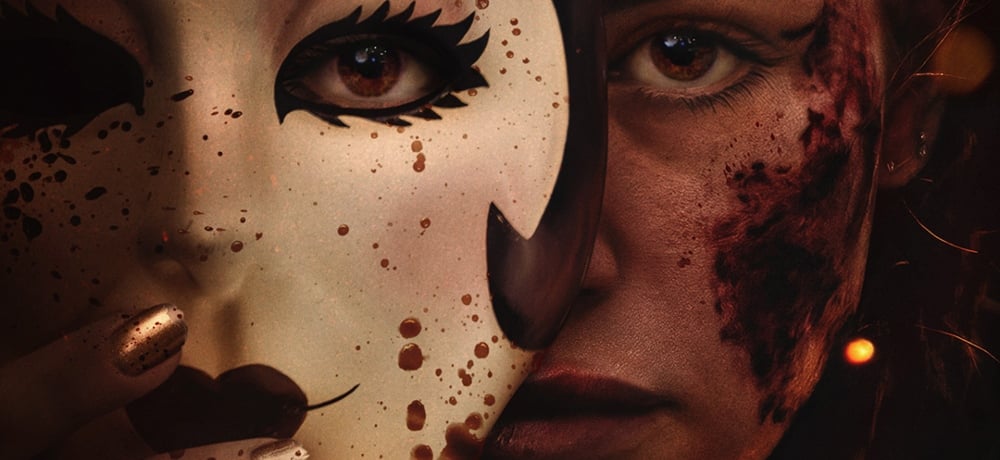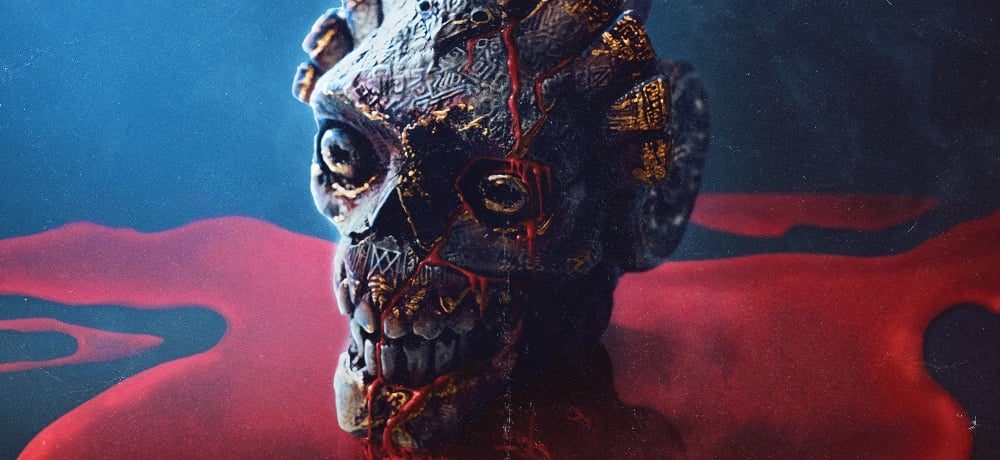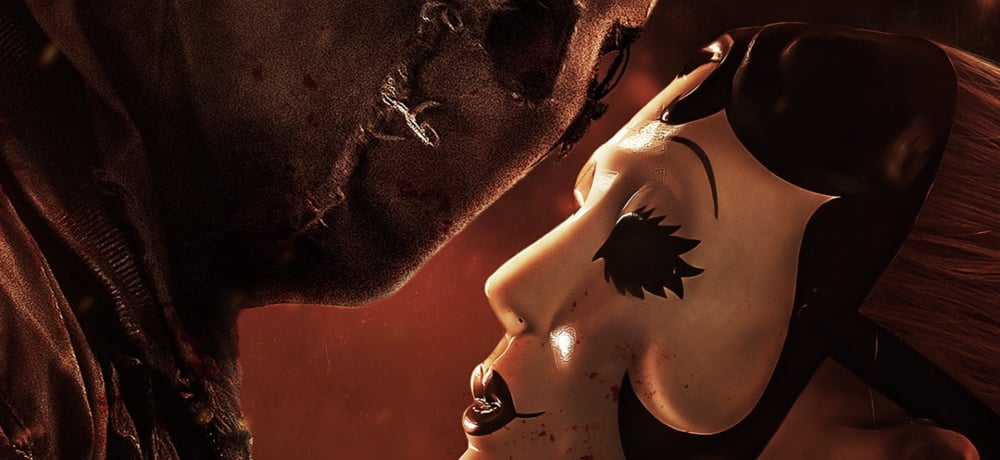





On Channel Zero: Butcher's Block, you can live in paradise... for a cannibalistic price. Last night on SYFY, viewers ascended the stairs to experience the finale of what has been a deliciously dark fairy tale of family relationships, socioeconomic divides, and guts... lots and lots of guts. To celebrate a season of ambitious storytelling (including two of the most unsettling scenes this writer has ever watched in any medium), I had the great pleasure of speaking with showrunner Nick Antosca to discuss this season's eerie Father Time entity, filming in Winnipeg (which is quickly becoming a new horror hub), working with visionary director Arkasha Stevenson, and the interconnected world where all of the Channel Zero seasons live.
Congratulations on Channel Zero: Butcher's Block, Nick. This season has truly disturbed me in the best possible way. The thing that stands out to me the most is the schizophrenia monster haunting Alice. I love how you've portrayed schizophrenia, and how the writers' room came up with this idea to take this artistic approach with the giant heads.
Nick Antosca: Well, the first thing I would say about that is that to me, there is a hidden question of whether what we're seeing really is a manifestation of her mental troubles, or whether it's something that Joseph Peach is showing her. By the time we get to the end of the season, I still think it's an open question of whether Alice did have incipient schizophrenia or not. She was terrified that she did, and Joseph Peach knew that, and did he exploit that or did she really have it? We wanted to represent it as an evolving nightmare version of herself. When we first see it in episode 2, when it burrows out from inside of her brain, Arkasha and I talked at great length about how to visually represent that. Originally in the script it was described as a kind of centipede-like thing. Arkasha smartly thought that it should have a distorted nightmare version of Alice's face.
We took some inspiration from the lady in the radiator in Eraserhead, of this kind of cheerful, puffy-faced cute thing that was also terrifying, and then each time she sees it after that, it's grown, evolved, and become more disturbing. It always has a twisted version of her face. For example, when you see it smile in the episode in the hospital, it has the same gap in its teeth that Olivia [Luccardi] has. When you see it in the field in episode 4, it's wearing the same shirt and shorts that she's wearing in the flashback in episode 2. We wanted it to be this vaguely cute, but absolutely horrifying version of herself that just gets bigger and bigger and more sinister and won't leave her alone.
Yeah, and it looked like you had a really flexible person walking on their hands, too. You've brought in performance artists in previous seasons, and you've continued to do that this season with things like The Exorcist crab walk down the stairs, which is really horrifying.
Nick Antosca: Yeah, that's a performer named Troy James, who is just incredibly flexible. He can run at full speed like that. He can just collapse into a pile of bones on the floor at a moment's notice. It's bizarre. He's incredible.
The guy who plays the tall version of Father Time, which is what we call the entity, in episode four is Quinton Boisclair, who played the Shadow King in Legion. He's this really tall guy who's quite strong, and you can put a bunch of stuff on him, and he's very creepy.
Yeah, that's going to haunt my nightmares, just like the Tooth Child and some of the stuff from No-End House. It's all fitting together very nicely. And I just I love the chemistry of the cast this year. If Krisha [Fairchild] and Brandon [Scott], could have their own spin-off show, that would be awesome. They have such a cool dynamic. Did you always see that happening when you were writing this season, or did that just kind of come about like, "We have to have these two characters on their own adventures"?
Nick Antosca: It came about as we were writing a little bit. In conceiving the first episode, we had sort of imagined that Louise was going to team up a little bit more with Alice. But, because of the journey that we needed to take Alice on, and putting her in the summerhouse for a couple of episodes, we actually found that it was more surprising and fascinating to have Louise and Luke, who were sort of natural enemies as a reporter and a cop, and who were natives to the city, team up and kind of be friends at the end. Krisha and Brandon Scott really have a lovely chemistry together. We came to that in the writing and we lucked out with the casting.
In the first five episodes, in addition to telling a story about sisters, you've had this really cool father-son dynamic with Luke and his dad. You're exploring different family relationships this season, which is really fitting because the Peach family is at the center of this story. Was that central theme of family something you were looking at doing when you first decided to adapt Kerry Hammond's Creepypasta story "Search and Rescue Woods"?
Nick Antosca: Not when we picked the original story, but once we got into our version of the story, we realized that family dynamics were playing out in all different aspects of the story. It's always compelling in a horror narrative to have it rooted in family stories. There are so many characters this season, and in previous seasons, who are searching for a surrogate parent. There's a theme in this particular season of patriarchs exploiting those in their power, with Joseph Peach and his children and how he had built this world and a system where they can all prey on people who are literally beneath them. And then there's Luke's father, and how he is exploiting his power, and how Luke doesn't want to see it, and finds kind of a surrogate mother, as well as a friend, in Louise. There's just a whole bunch of interesting dynamics to explore.
Yeah, definitely, and you've surprised me with Zoe and Alice, because early in this season it seemed like Alice was going to be the one taking the lead and being the responsible one. Now we've seen over the last couple of episodes that Alice is under Joseph Peach's spell, and Zoe's the one who's realizing, "This is not something we should get into."
Nick Antosca: Yeah, one thing I think is interesting about the journey of those two sisters, is probably about how pain inoculates you. Zoe has been through probably more trauma and more pain than Alice. She's been through it. Alice is a little bit more afraid of it, and so when they encounter this terrifying situation, Zoe ironically is more prepared to deal with it and resist it than Alice is.
And then you go back and explore the sisters' relationship with their mother, and I cannot believe some of the stuff you were able to do in the hospital scenes of episode 3. It's amazing what SYFY has allowed you to do on this series. Each season you've stepped beyond the bar that you've already set, and that's saying a lot.
Nick Antosca: A lot of credit there goes to Arkasha, the director. The stuff is written in the script, and then her instinct is always like, "What is the most interesting, unique way to do this? What is the most jolting way, and what element can we add to this to make it even more striking?"
In the script, it's written that Robert Peach is eating his cellmate, and Arkasha was like, "Well, he wouldn't want to get blood on his suit, would he? What if he's completely naked?" I was like, "That is more shocking." It's a collaboration, on even the most disturbing thing.
Yeah, and in some cases you show exactly what's happening, but in other cases you let our imaginations do that part of the storytelling. It really keeps you on your toes as a viewer because you're not sure if you're going to experience quiet horror one moment or gory horror the next. You push all of the creepy buttons.
Nick Antosca: Yeah, in Candle Cove nobody had seen the show before, and we were doing a show based on Creepypastas about evil puppets. We were kind of fighting the expectation from the beginning that it was going to be campy and crazy. We wanted to be as restrained and elegant—in terms of showing the scary shit, or the violence—as possible, and now that we've had two seasons before this, and we want to do different flavors every time, we wanted to do a season that was heightened and jolting and surprising at every turn, while still elegant.
Yeah, it definitely checks those boxes. With Candle Cove and No-End House and now Butcher's Block, each season you've explored a different type of location, from this season's rundown industrial area to the small rural town of Candle Cove and the suburbia of No-End House.
Nick Antosca: Yeah, that's all shot in the same 25 square miles of Winnipeg, Manitoba, which really speaks to the versatility of the environment and crew and the directors, that we've been able to make it look and feel totally different every time, which will continue to be the challenge going forward.
And as we go up to shoot season 4 soon, my buddy Nic Pesce, is shooting The Grudge remake at the same time. All of those local actors and crew are going to be kind of courted by both productions and everybody is going to be on the same kind of horror show.
Oh, wow, that's awesome. And if they get to film another Chucky movie up there in the next couple of years, then you're really going to have some fun.
Nick Antosca: Oh, yeah. I love that all of our crew, they've got stickers from Channel Zero and stickers from [Cult of] Chucky, which makes me proud.
Season 4 will be shot in Winnipeg as well, then?
Nick Antosca: Yeah, we're prepping it right now. I was just up there and I'm going to go up again later this month probably.
In addition to that, I know you have a movie adaption of one of your short stories coming up. Do you still get time to write your own fiction with all this other stuff on your plate?
Nick Antosca: A little bit. Antlers, the feature that I'm working on, has Scott Cooper directing and Guillermo del Toro producing. I co-wrote it with a writer named Henry Chaisson, based on a short story that I wrote. That's an original concept, so I would love to do more like that when I have time. I've got another feature that hasn't been announced yet, and it's also in development with a director who I really love.
I've got a couple of TV shows in development and I'm really excited about them, but yeah, there's always projects to do. When you make stuff, you spend years and years and years trying to get somebody to say "yes" to something, and then sometimes, once in a while, there's a bunch of things happening at once. It's like, "Shit, I want to do all of them," and I have a couple of exciting things in the works. I would love to make Channel Zero for years to come. We'll see, fingers crossed.
Now that you've done three seasons of Channel Zero, do you see each of these stories as taking place in the same universe? Do you see them as all being on the same Earthly plane?
Nick Antosca: I do. I think that they all exist in a world where nightmares intersect with human trauma. I could see them overlapping in a more overt way in future seasons if we have the chance.
Oh, sweet. So you're open to maybe doing some shout-outs, or crossovers, or whatever it might be, you could see some type of thing like that happening down the line?
Nick Antosca: Yeah, in fact, there are vague plans for that. We would have to get renewed, which we won't know for a little while. In future seasons, I think there's more connectivity to be explored.
---------
In case you missed it, check here to read our interview with Channel Zero: Butcher's Block director Arkasha Stevenson.
Clip via SYFY: